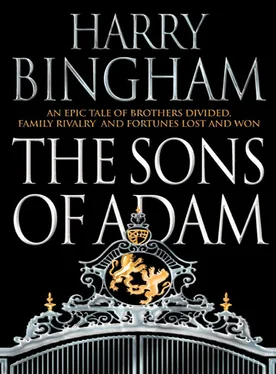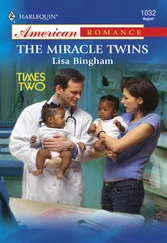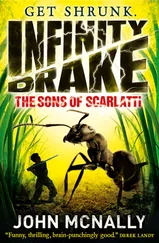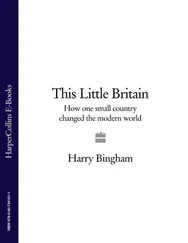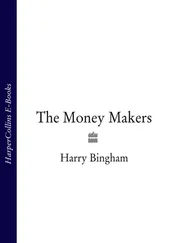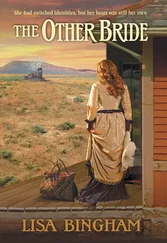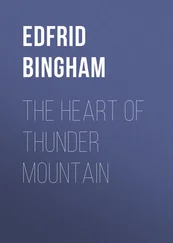‘Stable boy!’
But Guy’s last insult bounced off Tom’s back. Tom was gone to search for new entertainment.
His first trip was down to the kitchen: usually good for warm food and interesting gossip. But today his luck was out. He’d been spotted pinching the pastries and right now he wasn’t welcome. Tom thought about getting Alan and going down together to Tom’s father’s cottage. Jack Creeley had been teaching the two lads how to poach: how to tickle trout, how to set traps for rabbits, how to move silently in the dark. But just as Tom made up his mind to go, he heard a noise from the library. He was puzzled. Sir Adam was with the hunt. So if not him, then who was it in the library? Tom pushed the door open.
The man bending over Sir Adam’s desk wasn’t much to look at. He was a plump, overtailored man, with a walrus moustache and a chalky complexion. He was bent over the telephone apparatus in the corner of the room, shouting down the speaking trumpet, the earpiece jammed hard against his head.
And he was shouting – shouting about money. Business, money, the purchase of rights, company incorporation. Tom’s feelings of restlessness disappeared in a flash. He was rooted to the spot, burning to hear more.
And why? Simply this. In the seven and a half years he’d been alive, he’d never heard a rich man talking about money. He’d heard his father talk about it. He’d heard servants talk about it. But to Uncle Adam and people of that class, the subject seemed to be unmentionable. It was as though, to people who were already rich, money was like air: something that surrounded you, something you didn’t have to think about. And already Tom knew he wasn’t like that. He knew that Guy would one day inherit Whitcombe House and all the surrounding fields and farms. He knew that Alan, somehow, was in the same position: not as lucky as Guy, but still all right. And Tom? He didn’t know. He dressed the same as Alan, he ate the same meals, he studied the same books, he played the same games. But Alan’s father was a gentleman. Tom’s father was not. Seven and a half years old, and Tom didn’t know where he stood.

Tom had seen enough. Seen but not heard. He knocked loudly at the already open door and strolled on in. The man looked up.
‘Why, hello!’
‘Hello.’
‘You must be young Alan, I suppose.’
Tom shook his head. ‘I’m Tom.’
‘Oh, Tom! Well, good morning, young man.’
‘Who are you?’
‘My name’s Knox D’Arcy. Robert Knox D’Arcy.’
Tom wrinkled his forehead: the name meant nothing. On the table in front of D’Arcy, maps were spread out, maps traced in wild contours of brown and pink, maps speckled with place names that sounded like something from The Arabian Nights. Tom peered at them curiously.
‘Where’s that?’
‘Persia, Western Persia and Eastern Mesopotamia, to be exact.’ The man smiled at Tom’s blunt interrogation.
‘Why? Are you going there?’
‘No. I’m looking for something.’
‘What?’
‘Oil.’
There was a short silence.
‘What?’
‘Oil.’
Tom wrinkled his forehead again. This time his puzzlement ran deeper. ‘If you need oil, we’ve got plenty in the kitchen.’
The Walrus laughed. ‘Not that sort. The sort you put in your motor-car.’
Tom was about to point out the blindingly obvious, that the village carrier would happily deliver cans of petrol to the door, but the Walrus continued.
‘Not because I need petroleum spirit, but because I want to make some money.’
‘Money?’
The Walrus nodded. ‘Money, young man. I hope to purchase the right to look for oil in Persia. If I find it, I’ll collect it up and bring it in ships back to England. When I get it here, I’ll sell it to anyone with a motor-car – anyone with an engine, in fact.’
Tom’s eyes were as wide as soup bowls. He couldn’t have said why, but he felt he was in the presence of some vastly important truth. He sat down, staring at the maps.
‘In Persia?’ he asked. ‘There’s oil in Persia?’
‘I certainly hope so.’
‘Where in Persia?’
‘Under the ground. Perhaps even one mile down.’
‘Like coal mines?’
‘Yes. A little bit like coal mines.’
‘And money? If you dig up some oil, you can make money?’
‘That’s my intention, young man.’
‘A lot? A lot of money?’
And then the Walrus did something that – just possibly – would change the course of Tom’s life for ever. He hoisted the little lad up onto the desk, then squatted down so their faces were on a level.
‘Young man, do you want to know a secret?’
Tom nodded. ‘Yes, please.’
The Walrus paused a moment. His face was sombre. ‘Oil is the future,’ he said. ‘Oil is the fuel for the new century. Cars will guzzle it. Ships will swallow it. Factories run off it. Whoever can find the oil will be rich. Not simply rich – they’ll be kings of the world.’
That evening, Tom spoke to Sir Adam.
‘Uncle, who is that new man? The friend of yours. Knox somebody.’
‘Knox D’Arcy?’ Sir Adam chuckled. ‘He told me the pair of you had had a chat. Mr D’Arcy is a friend of mine, a businessman.’
‘Does he know a lot about business?’
‘I should say so. He was an ordinary fellow, living out in Australia, when he came across two miners who told him they thought they’d found some gold.’
‘And?’
‘And they had. D’Arcy helped them make a business out of it. A very, very good one. He’s ended up one of the wealthiest men in England. One of the wealthiest men in the entire world.’
Tom’s eyes widened. ‘Uncle, he says that the best way to be rich is to look for oil. Is he right?’
Sir Adam laughed again. ‘If Mr D’Arcy says so, then Mr D’Arcy is almost certainly right.’
Right or wrong, D’Arcy was a betting man. Having accumulated one colossal fortune in gold, he was keen to plunge a vast chunk of it into the search for Persian oil.
But things weren’t that simple.
For one thing, no oil had ever been found in Persia. Or rather: there were numerous traces of it in the geology, but no one had ever sent down a drill and come up with oil. Not in Persia. Not in Mesopotamia. Nowhere in the entire peninsula of Arabia.
And there was a second problem. The kingdom of Persia itself. The country was a poor one, squashed between British India on the one hand, Mother Russia on the other. The two giants jostled for control. Obtaining the right to drill wasn’t simply a matter of commerce. It was a question of politics.
Hence Sir Adam.
Before settling back in England, Sir Adam had been a diplomat, rising to become the British ambassador in Tehran. He knew the Shah. He knew the country’s politics. He’d learned who mattered and who didn’t.
And that was why D’Arcy had come to Sir Adam that New Year’s Day. He had a proposition. The proposition was this: Sir Adam would help D’Arcy win an oil concession, giving D’Arcy the right to drill. In exchange, Sir Adam would earn a generous commission. Sir Adam, delighted with the adventure, agreed at once. He went to Tehran. He negotiated skilfully. He bribed the highest officials with gold, he bribed the lowest officials with paper. He even bribed the eunuch who brought the Shah his morning coffee.
Sir Adam did everything he needed to do.
And on 28 May 1901, he got what he wanted. He won the deal.
It was two months later. The family was at breakfast. Tom and Alan poked unhappily at their platefuls of porridge.
Читать дальше
